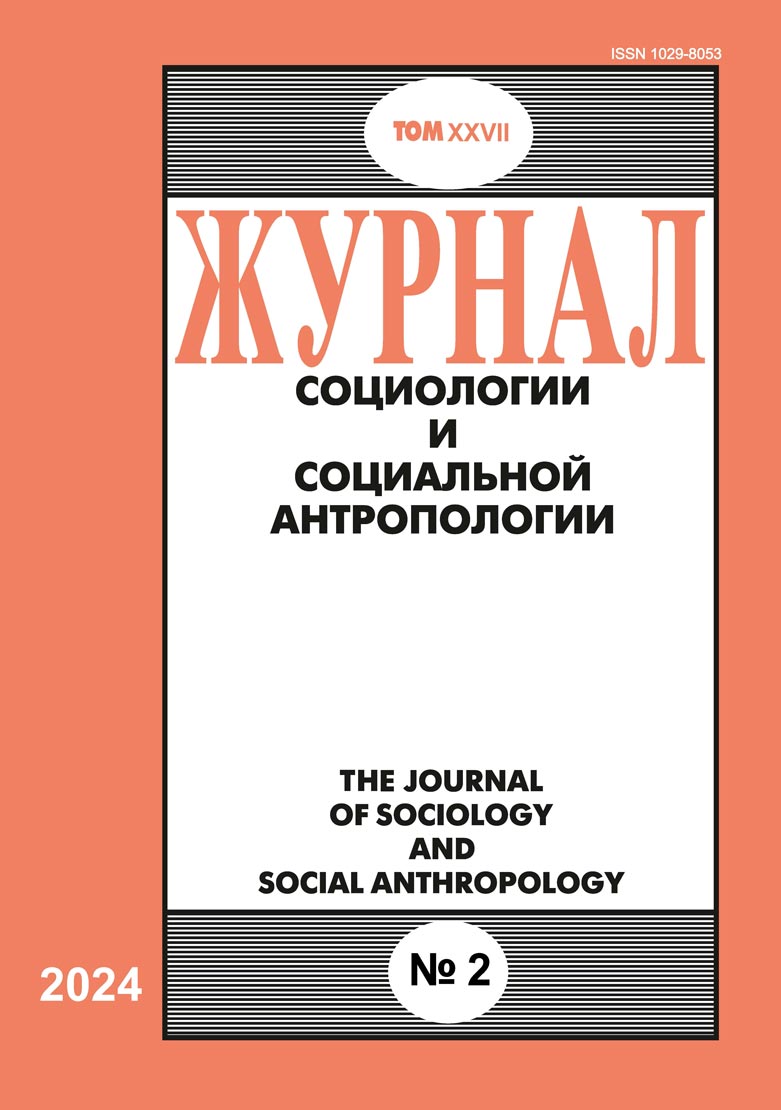Факторы и предикторы обращения за психологической помощью в религиозные организации
Научная статья
Аннотация
Литература
Абдуллин А.Г., Тумбасова Е.Р., Кукар У.Ю. (2023) Психологические последствия пандемии COVID-19. Психопедагогика в правоохранительных органах, 28 (1), 58–64. https://doi.org/10.24412/1999-6241-2023-192-58-64.
Бессокирная Г.П., Большакова О.А., Караханова Т.М. (2023) Опыт исследования духовно-нравственного состояния российского общества. Социологическая наука и социальная практика, 11(3): 6–36. https://doi.org/10.19181/snsp.2023.11.3.1.
Володина К.А., Рагулина А.А., Русяева И.А. (2022) Психологическое состояние студентов в условиях дистанционного обучения в период пандемии COVID-19. Личность в меняющемся мире: здоровье, адаптация, развитие, 10(1): 59–72.
Гаврилова Ю.В., Попова А.А. (2022) Роль депривации в трансформациях индивидуального религиозного сознания в условиях пандемии COVID-19. Социология, 1: 184–192.
Дивисенко К.С., Белов А.Э. (2017). Социальные исследования субъективного благополучия в контексте духовности и религиозности. Социологический журнал, (2): 51–73. https://doi.org/10.19181/socjour.2017.23.2.5159.
Исаева В.Б. (2014). Современные концептуальные модели социологии конверсии. Известия Российского государственного педагогического университета им. А. И. Герцена, 166: 108–113.
Камхен В.Б., Калиева Д.А., Нурализода М. (2021) Ассоциация расстройств тревожно-депрессивного спектра и качества жизни трудоспособного населения в контексте covid–19. Вестник Казахского Национального медицинского университета, 1: 107–111.
Корсаков А.И. (2012). Религия и наука в трудах основателя первого позитивизма. Вестник Православного Свято-Тихоновского гуманитарного университета. Серия 1: Богословие. Философия. Религиоведение, 40 (2): 80–92.
Рис Н. (2005) «Русские разговоры»: культура и речевая повседневность эпохи перестройки. М.: Новое литературное обозрение.
Руткевич Е.Д. (2013). «Новая парадигма» в социологии религии: pro и contra. Вестник Института социологии, 6: 207–233.
Фрейд З. (1989). Будущее одной иллюзии. Сумерки богов. М.: Политиздат.
Хабермас Ю., Тягунова Т. (2010). Расколдовывание религиозно-метафизических картин мира и возникновение современных структур сознания. Социологическое обозрение, 9(1): 27–52.
Шишигина М.А. (2022) Цифровые практики в прогрессивном иудаизме в России во время пандемии COVID-19. Цифровая иудаика: исследование еврейских общин в онлайн-пространстве, (1): 45–63. https://doi.org/10.31168/0470-1.05.
Юрчак А.В. (2016) Это было навсегда, пока не кончилось. Последнее советское поколение. М.: Новое литературное обозрение.
Яковлева Ю.А. (2015). Факторы нетрадиционной религиозно-групповой идентификации индивидов. Актуальные проблемы гуманитарных и естественных наук, (3–2): 250–252.
Якшимбетова А.И. и др. (2022) Тревога и депрессия у пациентов, перенесших новую коронавирусную инфекцию SARS-CoV-2. Re-health journal, 2: 95–98.
Bessi A. (2016) Personality traits and echo chambers on Facebook. Computers in Human Behavior, 65: 319–324.
Bergin A.E. (1980) Psychotherapy and religious values. Journal of consulting and clinical psychology, 48(1): 95.
Bergin A.E., Jensen J.P. (1990) Religiosity of psychotherapists: A national survey. Psychotherapy: Theory, Research, Practice, Training, 27(1): 3–7. https://doi.org/10.1037/0033-3204.27.1.3.
Bianchi E.C. (1989) Psychotherapy as religion: Pros and cons. Pastoral Psychology, 38, 67–81. https://doi.org/10.1007/BF01094868.
Bruce S. (2006) Sociology of Conversion: The Last Twenty-Five Years. In: Bremmer J.N., Bekkum W.J., Molendijk A.L. (eds.) Paradigms, poetics, and politics of conversion. Leuven: Peters: 1–11.
Collins R. (1994) Four sociological traditions: Selected readings. Oxford: Oxford University Press.
Collins R. (2004). Interaction ritual chains. Princeton: Princeton University Press.
Dzialoshinskiy I., Pilgun M. (2015). Axiological Foundations of Business Ethics in the Post-Socialist Russia: Intercultural Context. International Journal of Economics and Financial Issues, 5(3): 263–273.
Ellis A. (1980) Psychotherapy and atheistic values: A response to A. E. Bergin's "Psychotherapy and religious values." Journal of Consulting and Clinical Psychology, 48(5): 635–639. https://doi.org/10.1037/0022-006X.48.5.635.
Epstein M.N., Genis A.A., Vladiv-Glover S.M. (2015) Russian postmodernism: New perspectives on post-soviet culture (Vol. 3). Oxford; N.Y.: Berghahn Books.
Funk C.L. et al. (2013) Genetic and Environmental Transmission of Political Orientations. Political Psychology, 34(6): 805–819.
Furseth I., Repstadt P. (2006) An Introduction to the Sociology of Religion. Classical and Contemporary Perspectives. Burlington, VT: Ashgate.
Hanegraaff W. J. (1997) New Age religion and Western culture: Esotericism in the mirror of secular thought. N.Y.: State University of New York Press.
Hofmann L., Walach H. (2011) Spirituality and religiosity in psychotherapy — A representative survey among German psychotherapists, Psychotherapy Research, 21(2): 179–192. https://doi.org/10.1080/10503307.2010.536595.
Hornsey M.J., Harris E., Bain P., Fielding K.S. (2016) Meta-analyses of the determinants and outcomes of belief in climate change. Nature climate change, 6(6): 622–626.
Koenig H.G., Pritchett J. (1998) Religion and psychotherapy. In: Koenig H.G. (ed.) Handbook of religion and mental health. Cambridge: Academic Press: 323–336
Meadow M.J. (1986) Current and emerging themes in the psychology of religion. Journal of Psychology and Christianity, 5(2): 56–60.
Post B.C., Wade N.G. (2009) Religion and spirituality in psychotherapy: a practice-friendly review of research. Journal of Clinical Psychology, 65: 131–146. https://doi.org/10.1002/jclp.20563.
Radnitz S., Underwood P. (2015) Is Belief in Conspiracy Theories Pathological? A Survey Experiment on the Cognitive Roots of Extreme Suspicion. British Journal of Political Science, 47 (1): 1–17.
Anderson R.A., Inbar Y., Pizarro D.A. (2021) A matter of taste: Gustatory sensitivity predicts political ideology. Journal of Personality and Social Psychology, 121(2): 394.
Schutz A. (2012) Collected papers I. The problem of social reality. Vol. 11. Berlin: Springer Science & Business Media.
Szasz T.S. (1974) The myth of psychotherapy. American journal of psychotherapy, 28(4): 517–526.
Taylor E. (1999) Shadow culture: Psychology and spirituality in America from the Great Awakening to the new age. Berkeley, California: Counterpoint.
Vitz P.C. (1994) Psychology as religion: The cult of self-worship. Michigan: W.B. Eerdmans Publishing.
Voas D., Crockett A. (2005) Religion in Britain: Neither believing nor belonging. Sociology, 39(1): 11–28.
Wood M.J., Douglas K.M., Sutton R.M. (2012). Dead and alive: Beliefs in contradictory conspiracy theories. Social Psychological and Personality Science, 3: 767–773. https://doi.org/10.1177/1948550611434786.
Zmigrod L., Rentfrow P.J., Robbins T.W. (2018) Cognitive underpinnings of nationalistic ideology in the context of Brexit. Proceedings of the National Academy of Sciences, 115(19): E4532–E4540.
Поступила: 23.09.2023
Опубликована: 11.06.2024






